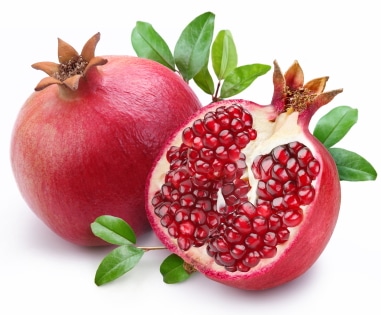
An Ancient Fruit Grows in Popularity
Despite its popularity in other regions of the world, the pomegranate fruit has only recently risen in popularity in the United States, primarily because of its health benefits. The pomegranate fruit is often referred to as a superfruit because it contains phytonutrients not found in typical fruits. Only recently has scientific research focused on the health benefits of the pomegranate fruit and its abundance of phytonutrients, but it’s been used as a remedy in Ayurveda medicine for thousands of years to treat diarrhea and other intestinal conditions.
What Are the Health Benefits of the Pomegranate Fruit?
The fruit of the pomegranate is rich in vitamin C, vitamin K, and some B vitamins, but that’s not what makes the pomegranate fruit so special from a health standpoint. They’re a rich source of polyphenols called ellagitannins, strong antioxidants with cell-protective properties. In addition to ellagitannins, the pomegranate fruit contains an abundance of other antioxidants that help to protect against oxidative damage of the type that can lead to chronic diseases such as cancer and aging.
How Pomegranate Fruit Benefits the Heart
The ellagitannins and other polyphenols in pomegranate have another benefit. Preliminary research shows pomegranate juice reduces the oxidation of LDL-cholesterol, the “bad” form of cholesterol that’s linked with heart disease. Oxidation of LDL-cholesterol is one of the first steps in the sequence that leads to arterial plaque and heart disease. The polyphenols in pomegranate juice also lowers systolic blood pressure by blocking the action of an enzyme called angiotensin-converting enzyme that causes arteries to constrict.
Other Health Benefits of Pomegranates
Other research suggests that pomegranate juice has anti-viral and anti-bacterial benefits that help ward off the common cold and flu viruses. Compounds pomegranate may help in the fight against gum disease by keeping mouth bacteria that contribute to plaque and gingivitis in check. There are also ongoing studies looking at the anti-cancer benefits of the pomegranate fruit. Preliminary research shows it may stop some types of cancer from spreading, particularly prostate cancer. Pomegranate extract is also being added to some skin care products because it protects against sun damage.
Other Nutritional Information about Pomegranates
Pomegranates contain almost no fat, but they are high in natural sugars, and they’re not as low in calories as some fruits. A whole pomegranate has 234 calories and 39 grams of sugar. Surprisingly, despite their high sugar content, they may be beneficial for diabetics. Researchers point out that the sugars in pomegranate are attached to antioxidants and may not have the same effects as free sugars on blood sugar levels.
One word of warning. If you’re taking prescription medications, particularly statins to lower cholesterol, talk to your doctor before drinking pomegranate juice or eating the fruit. Pomegranate and pomegranate juice can interfere with the breakdown of these medications.
How to Get the Benefits of the Pomegranate Fruit
Pomegranate juice is sold in many health food stores and natural food markets, and you can buy whole pomegranates at some supermarkets. Pomegranate juice can vary in flavor from sweet to tangy depending upon the number of tannins it contains. Drink it as is, add it to smoothies or use it to make salad dressings and sauces. You can also purchase dried pomegranate seed casings called arils. Sprinkle them on ice cream or spoon them into yogurt. You can also add them to your morning bowl of oatmeal for additional antioxidant power. Enjoy the many health benefits of this ancient fruit.
References:
Natural Products Marketplace. “What is a Superfruit”
Clin. Nutr. 23(3): 423-33.
Atherosclerosis. 158(1): 195-8.
Medscape.com. “Antioxidants Used in Skin Care Formulations: Pomegranate”
Medscape Today. “Antioxidant and Anti-Atherogenic Effects of Pomegranate: Interactions”
Journal of Herbal Pharmacotherapy. 6(2): 79-92.
Science Daily. “Pomegranate Juice Components Could Stop Cancer from Spreading, Research Suggests”
Nutraingredients.com. “Pomegranate Juice Components Could Stop Cancer from Spreading, Research Suggests”
Related Articles By Cathe:
Can an Ingredient in Pomegranates Fight Muscle Aging?
6 Healthy Autumn Produce Choices to Pick Up at Your Local Farmer’s Market

